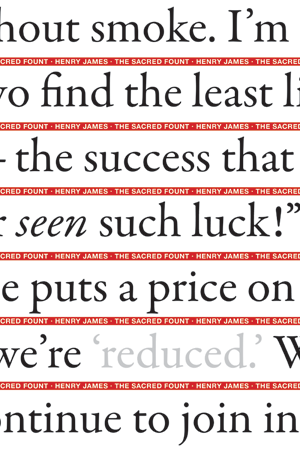“Gertrude Stein was a great reader. In novels, Henry James’s for instance, characters talk, and in their nuances lurk the subtlest intricacies of the author’s web. Imagine a text of a novel, say James’s The Sacred Fount (1901), from which everything has been extracted except the dialogue.”
(Guy Davenport, “Late Gertrude,” p. 189 in The Hunter Gracchus)
Following Guy Davenport’s suggestion, here’s a version of Henry James’s The Sacred Fount from which everything has been extracted except the dialogue. A print-on-demand version can be purchased at Lulu; or, download a PDF version for free.
